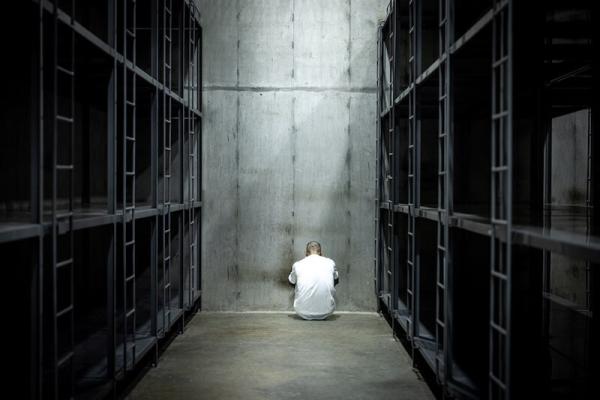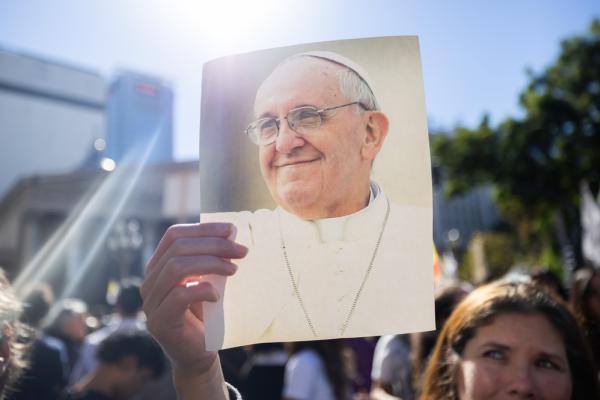This past fall, thousands of Central American people left behind the familiarity and embrace of their homeland in search of safety and stability. After months of waiting at the U.S.-Mexico border — often in detention centers — many have now been granted the ability to plead their asylum cases. This type of civil detention is the cruel and profitable way the U.S. ensures people in search of refuge attend their court hearings. The U.S. holds more than 40,000 people in immigration detention every day. These prisons hold asylum seekers captive, robbing them of hope. In a bold, sacrificial effort to reclaim freedom and a fair chance at asylum, hundreds of detained immigrants have launched hunger strikes.
These asylum seekers join a long history of people fighting for all types of liberties: freedom to vote, to govern independently, to live. Now, in the spirit of Scottish suffragette Marion Wallace Dunlop, asylum seekers will have their determination for dinner.
Hunger strikes allow detained immigrants to regain their agency while simultaneously throwing themselves on the mercy of the very institution that has oppressed them. They trust that a responsible society would not allow them to die, and hope that the moral nature of their demands will ultimately achieve reform.
Labor activist César Chávez embodied this same trust when he embarked on three fasts for America’s farmworkers, ranging from 24 to 36 days. Chavez once described fasting in this way:
A fast is first and foremost personal. It is a fast for the purification of my own body, mind, and soul. The fast is also a heartfelt prayer for purification and strengthening for all those who work beside me in the farmworkers movement. The fast is also an act of penance for those in positions of moral authority and for all men and women activists who know what is right and just who know that they could and should do more. The fast is finally a declaration of non-cooperation.
In the first three months of 2019 there have been at least six hunger strikes at different detention centers around the country. In April, Attorney General William Barr drafted a memo that will mandate the indefinite detention of asylum seekers, forcing them to fight their cases behind bars. Though advocates have initiated a lawsuit to stop the directive, the continued threat of sustained detention will likely spur on continued hunger strikes.
As we watch hundreds of asylum seekers face indefinite imprisonment at detention centers, we call for a moral renewal that will put an end to the criminalization of immigrants — an inhumane practice that feeds this nation’s industrial prison complex. Below we uplift the stories of brave women and men who have given their bodies as sacrifice for justice at detention centers. From Louisiana to Texas to Washington, these detained immigrants call for fair treatment, access to bond, and ultimately, freedom.
READ: ICE Detains Pastor, Leaving a Wisconsin Community Reeling
Tacoma, Washington
Beginning in late August, approximately 60 immigrants held at Northwest Detention Center in Tacoma, Wash., joined hundreds of incarcerated people across the country in their hunger strikes, broadly protesting “prison slavery.” Their participation was simultaneously an act of solidarity and a spotlight on the inhumane conditions immigrants face while in detention.
Specifically, the detained immigrants advocated for better medical care, reunions with their children, an end to retaliation for those engaging in hunger strikes, and minimum wage for work completed while in detention. While 200 people initially planned to participate, many dropped out due to health concerns or fear of retaliation from guards.
Two of the strikers, Viacheslav Poliakov and Raquel Martinez Diaz, filed a federal lawsuit for a temporary restraining order that would prevent ICE from force-feeding strikers, placing strikers in solitary confinement, and from threatening negative consequences on participants’ immigration cases. ICE refuted many of the accusations, and ultimately, the judge denied Poliakov and Martinez Diaz’s order. Poliakov’s strike lasted an entire month before he resumed eating, and Martinez Diaz stopped striking after a few days following threats from guards.
Mergensana Amar was an asylum seeker also imprisoned at Northwest Detention Center who refused to eat late last year in protest of his sustained detention and fear of deportation back to Russia. His strike lasted for 86 days.
Tragically, Amar died of suicide while still in detention in late November. Maru Mora Villalpando, a community organizer with NWDC Resistance, said that Amar’s death “is an example of the lengths that ICE will go to keep people in detention. He kept telling us ‘I’d rather die here than be deported.’”
Sadly, these strikes were largely unsuccessful. This outcome leaves the question: If hunger strikes and suicides aren’t enough to convince this administration to enact reforms in the immigration system, then what will be?
El Paso, Texas
In late December 2018, 10 Punjabi Sikh Indian asylum seekers began a hunger strike to protest their prolonged detentions and verbal abuse and threats from the guards. Eight of the strikers had passed their credible fear interviews, the first step in the asylum process, but were still denied bond. So they fought for their cases behind bars instead.
Our current detention system is designed to kill an immigrant’s spirit, while ensuring that their body is physically able to continue to suffer. Nowhere is this clearer than when ICE begins to force-feed immigrants.
In February, a federal judge granted permission for ICE to begin force-feeding nine of the hunger strikers. One of the strikers described the process this way: “‘They tie us on the force-feeding bed, and then they put a lot of liquid into the tubes, and the pressure is immense so we end up vomiting it out. We can’t talk properly, and we can’t breathe properly.’”
On Valentine’s Day of this year, a judge decided not to renew the force-feeding order, giving the men a period of respite from the torturous feeding sessions. Human Rights Watch deems force-feeding “cruel, inhuman, and degrading,” adding that “medical ethics and human right norms generally prohibit the force-feeding of detainees who are competent and capable of rational judgement as to the consequences of refusing food.”
For Jasvir and Rajandeep Singh, the final two hunger strikers, this story has a better ending. Rep. Veronica Escobar (D-Texas) struck an unofficial deal with a top ICE official: If Jasvir and Rajandeep started eating for two weeks, then ICE would seriously consider granting bond. The ICE official agreed, and on March 16, the hunger strike ended.
However, their actual release took several weeks and a follow-up visit by a delegation of Democratic members of Congress. While a judge has ordered the deportations of Jasvir and Rajandeep, the young men plan on appealing that decision.
READ: 'Why Are You Made to Suffer for Needing Asylum?'
Ferriday, Louisiana
Last fall, I, Sandy, met a group of Salvadoran, Honduran, and Guatemalan families in Mexico City who were on their way to the U.S. to seek asylum. Their stories were terrifying: Some had experienced severe abuse and others had literally been set on fire by groups who were extorting them. Every person I talked to was fleeing a nightmare.
Our group created spaces for creative healing through art, and I facilitated a workshop about immigrant rights, detailing the general process of seeking asylum in the U.S. I had to describe the truth about the fate that awaited them: No matter how they sought to enter the U.S., they would most likely spend time in detention because the U.S. has criminalized immigration.
It is already a daunting undertaking to fill out the right immigration forms, appear before judges and officials, and secure legal representation. Navigating this process while in prison makes a successful case almost impossible.
The families I met have been in detention since they arrived in the U.S. in December. Most of them are adults, so even while they traveled as family units, they were separated and sent to detention centers across the country, with little to no contact with their loved ones. For some, depression, hopelessness, and boredom have set in. Others have kept a willing spirit, relentless in their efforts to attain safety and protection outside a detention center.
One of the men I met passed his credible fear interview, allowing him to begin the process of seeking asylum. As he awaited his first court hearing, he was transferred to the River Correctional Facility in Ferriday, La.
River Correctional, operated by the private prison company LaSalle Corporation, opened its doors to ICE in January. Because River Correctional is not included on the ICE locator system list of detention centers, families have a difficult time visiting and arranging legal support for their detained loved ones.
Since arriving at this facility, my friend has witnessed terrible mistreatment and the desperate measures people use to combat it, including a hunger strike and a suicide attempt this past March. Activate Labs obtained an audio testimony from a man who participated in a hunger strike at this same facility:
They are very racist. ICE told us that if someone passed the credible fear interview, they had the right to fight for their asylum case outside of a prison. But now, the judge here, Judge Landis, is denying all bonds. We can have letters of support, sponsors — we ask for bond but we’re all denied. Those of us that have been in the other prison [Tallahatchie, Miss.] we know that there is an ability to get parole and that ICE can grant it. Well here, ICE does not visit us; we hardly see the officers — maybe once every 15 days. They just want us to be locked up. So, we are doing a hunger strike.
Hunger strikes allow detained immigrants like my friend to imagine a different future — one where they can fight for their case outside of detention. The emotional and physical toll that people experience in detention is devastating and cruel. We walk alongside our friend by keeping in touch through phone calls and letters and connecting him to legal resources. But we are also asking for no more funds to go to this unjust practice. Detention of asylum seekers must stop.
Many asylum seekers must make the cruel choice between dying in their home countries or dying in detention. Hunger strikes are the ultimate call to have their voices heard. We must listen.
Got something to say about what you're reading? We value your feedback!








